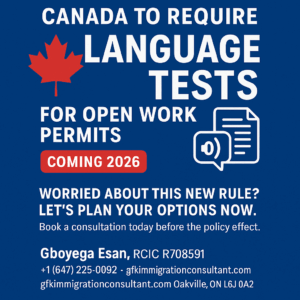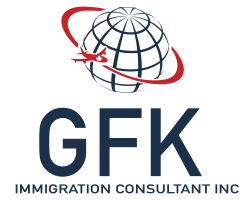
Canada To Require Language Tests For Open Work Permits In 2026
Canada is poised to revolutionize its International Mobility Program (IMP) with a brilliant policy shift for open work permit applicants by mandating the need to prove proficiency in English or French.
This forward-thinking requirement, proposed by Immigration, Refugees and Citizenship Canada (IRCC), is a game-changer for temporary workers, particularly those applying for spousal open work permits (SOWP).
By mandating language testing for certain IMP streams, IRCC aims to enhance workforce integration, curb exploitation like contract marriages, and ensure Canada’s labour market thrives with skilled, communicative talent.
This comprehensive guide explores why this is a stellar move, which programs will be affected, and how applicants can prepare for this transformative change set to reshape Canada’s immigration landscape.
Table of Contents
What Is the International Mobility Program (IMP)?
The International Mobility Program (IMP) is a Canadian immigration framework that allows employers to hire temporary foreign workers without the time-consuming LMIA process.
This flexibility makes it a vital tool for addressing labour shortages and attracting skilled talent. The IMP includes several streams tailored to different needs:
-
- International Experience Canada (IEC): Unlikely to require testing due to reciprocal agreements with partner countries prioritizing youth mobility over long-term integration.
- Spousal Open Work Permits (SOWP): Currently exempt but likely to require testing to ensure genuine applicants and integration.
-
- Post-Graduation Work Permits (PGWP): Supports international graduates in Canada transitioning to the Canadian job market.
- Bridging Open Work Permits (BOWP): Unlikely to require testing, as applicants often meet language requirements for permanent residency pathways.
- Intra-Company Transferees: Expected to remain exempt, as eligibility focuses on company-specific roles, not broad language integration.
- Significant Benefit Categories: Expected to remain exempt, as roles like athletes or artists prioritize cultural contributions over language skills.
- Free Trade Agreement Professionals: Exempt, based on trade commitments under agreements like CUSMA or CETA.
- Charitable or Religious Work: Exempt, focusing on the nature of the work.
A key feature of the IMP is its open work permits, which let holders work for any employer, anywhere in Canada, without job-specific restrictions.
In 2024 alone, over 100,000 open work permits were issued through the IMP, highlighting its critical role in Canada’s economy.
What’s Changing For Canada’s Open Work Permits Under IMP?
The proposed amendments to the Immigration and Refugee Protection Regulations will mandate language proficiency testing for certain IMP open work permit applicants, with spousal open work permits likely among the targeted streams.
Applicants will need to submit results from designated third-party organizations, such as IELTS, CELPIP, TEF Canada, or TCF Canada, assessing reading, writing, listening, and speaking skills.
The tests will align with the Canadian Language Benchmark (CLB) or Niveaux de compétence linguistique canadiens (NCLC) scales, with expected thresholds of CLB 5 for general roles and CLB 7 for skilled positions, though IRCC has yet to confirm exact levels.
Test results must be less than two years old, per IRCC’s standard validity period.
The IMP, managed by IRCC, facilitates temporary workers’ entry without requiring a Labour Market Impact Assessment (LMIA), unlike the Temporary Foreign Worker Program (TFWP).
Currently, most IMP streams, except the Francophone Mobility Program (requiring NCLC 7), are exempt from language testing.
IRCC’s announcement targets “certain” streams, with SOWPs a likely focus due to their role in family reunification and past vulnerabilities to exploitation.
However, IRCC has not clarified whether all exempt programs will be affected, leaving uncertainty about the policy’s full scope.
Why It Matters?
Mandating language testing for IMP open work permits is a visionary step by IRCC, reinforcing Canada’s commitment to a robust, fair, and effective immigration system.
The policy’s key benefits include:
-
- Preventing Exploitation: Language testing ensures genuine applicants, particularly SOWP holders, reducing fraudulent practices like contract marriages used to secure work permits.
- Enhancing Workforce Integration: Proficiency in English or French enables workers to communicate effectively, boosting workplace safety, collaboration, and career mobility.
- Supporting Economic Growth: Language-ready workers fill labor gaps in high-demand sectors like healthcare, technology, and engineering, driving Canada’s economy.
- Facilitating Permanent Residency: Language skills align with Express Entry requirements (e.g., CLB 7), smoothing transitions for IMP workers seeking permanent status.
- Ensuring Transparency: Third-party testing standardizes assessments, eliminating subjectivity and ensuring fairness.
This policy is a masterstroke in addressing exploitation, particularly for SOWPs. Contract marriages—fraudulent relationships orchestrated for immigration benefits—undermine Canada’s system and exploit vulnerable individuals.
Language testing adds a verifiable criterion, deterring such practices by requiring applicants to demonstrate integration-ready skills.
IRCC’s 2014-2022 IMP evaluation highlighted language barriers as a challenge, prompting this change to ensure workers thrive.
The policy aligns with the Immigration Levels Plan 2025-2027, which aims to reduce temporary resident numbers while prioritizing high-impact contributors, reinforcing Canada’s global leadership in immigration policy.
Impact on Applicants and Stakeholders
For Applicants:
Language testing is a brilliant requirement, ensuring SOWP applicants can excel in Canada’s workforce.
Proficiency opens doors to diverse roles, from retail to professional sectors, enhancing economic contributions.
For example, a spouse with CLB 7 can pursue skilled positions, boosting family stability.
The policy deters contract marriages, protecting genuine applicants by filtering out fraudulent ones.
Applicants with limited proficiency may need preparation, but free resources like Language Instruction for Newcomers to Canada (LINC) make this achievable.
For Families: Testing strengthens family reunification by equipping spouses to work effectively, reducing dependency.
It safeguards against exploitation, ensuring authentic relationships. Families from non-English or non-French-speaking regions can leverage accessible training to meet standards, fostering long-term integration.
For Employers: Employers benefit from language-proficient workers who adapt quickly, requiring minimal training.
While the applicant pool may shrink initially, the focus on qualified candidates enhances productivity in industries like hospitality and technology.
The $230 employer compliance fee remains unchanged, but hiring strategies may prioritize tested applicants.
For Canadians: A language-ready IMP workforce drives economic growth, filling labour gaps and supporting integration.
By preventing exploitation, the policy upholds public trust, aligning with Canada’s goal to balance reduced temporary residents with impactful contributions.
Challenges:
- Accessibility: In-person testing excludes online options, challenging applicants in rural or conflict zones.
- Preparation Time: Applicants may need months to achieve CLB levels, delaying permits.
- Fairness: SOWP holders prioritizing family roles may face hurdles, though anti-exploitation benefits outweigh concerns.
- Uncertainty: IRCC’s lack of clarity on affected streams requires proactive planning.
When Will This Change Be Implemented: What Happens Next
The language testing amendments are in early development, with pre-publication in the Canada Gazette, Part I targeted for spring/summer 2025, followed by a 30-day public comment period.
IRCC conducted consultations with provinces and territories in February 2025 and plans further engagement with employers, immigration consultants, and community organizations in 2025.
Final publication in the Canada Gazette, Part II is expected by 2026 or 2027, when the requirement will take effect for designated IMP streams, likely including SOWPs.
IRCC will use feedback to clarify affected streams, CLB levels, and accommodations (e.g., exemptions for applicants with disabilities).
The 2025 consultations are crucial for ensuring a balanced, inclusive policy.
Practical Tips for Navigating the Change
-
- Start Language Training: Enroll in classes to build English or French skills, targeting CLB 5-7.
- Practice Tests: Prepare for IELTS, CELPIP, TEF, or TCF using free online resources or paid courses.
- Locate Testing Centres: Find in-person centres via ielts.org or celpip.ca, as IRCC requires in-person tests.
- Verify Eligibility: Confirm your IMP stream (e.g., SOWP) requirements, anticipating language testing for SOWPs.
- Consult Experts: Work with a Regulated Canadian Immigration Consultant (RCIC) for guidance.
- Monitor Updates: Subscribe to our newsletters for announcements on streams, CLB levels, and timelines.
Canada’s decision to mandate language testing for open work permits under the IMP, particularly for spousal open work permits, is a stellar policy move set to transform immigration by 2026.
By ensuring proficiency, IRCC prevents exploitation, enhances integration, and strengthens Canada’s economy.
While BOWP, Intra-Company Transferees, and Significant Benefit Categories are likely exempt, SOWP applicants will benefit from this focus on genuine contribution.
Preparing now and engaging in 2025 consultations will ensure applicants thrive.
Share this article to spread awareness, and join the conversation on social media platforms like “X” to shape a brighter immigration future.
When will the language testing requirement for IMP work permits start?
The requirement is set to begin in 2026 or 2027, with pre-publication in the Canada Gazette in spring/summer 2025 and final details by 2026.
Which IMP programs will require language testing?
IRCC hasn’t confirmed all affected streams, but spousal open work permits are likely included, while BOWP are unlikely to be affected.
Why is Canada introducing language tests for open work permits?
To enhance integration, prevent exploitation like contract marriages, and ensure economic contributions, aligning with Canada’s immigration goals.
Certain IMP open work permit applicants, likely including spousal permits, must submit English or French proficiency test results (e.g., IELTS, CELPIP, TEF) to ensure workforce integration.
GFK Immigration
Gboyega Esan RCIC R708591
Phone: +1 (647) 225-0092
#CanadaPR #Citizenship #GFKImmigrationExperts #studyincanada #Steinbach #canada #Alberta #studyinaustralia #ielts #studentvisa #studyinusa #studyvisa #immigration #canadavisa #visa #education #internationalstudents #overseaseducation #study #canadaimmigration #ExpressEntry
